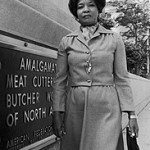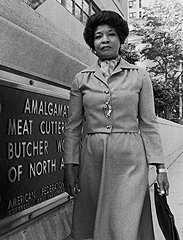
If you grew up in Chicago in the 1960s and early 1970s, like I did, you knew who Addie Wyatt was. And if you saw her walking serenely down the street, you never would have pegged her as a meatpacker. But that’s exactly how she began her career: as a meatpacker in an Armour and Co. cannery during World War II. The following year, she joined the United Packinghouse Workers of America, but soon left the assembly line to become a full-time union organizer. From there, she blazed a historic trail. Wyatt became active in the labor movement at a time when neither women nor people of color were welcomed with open arms. But she refused…
 If you grew up in Chicago in the 1960s and early 1970s, like I did, you knew who Addie Wyatt was.
If you grew up in Chicago in the 1960s and early 1970s, like I did, you knew who Addie Wyatt was.
And if you saw her walking serenely down the street, you never would have pegged her as a meatpacker. But that’s exactly how she began her career: as a meatpacker in an Armour and Co. cannery during World War II. The following year, she joined the United Packinghouse Workers of America, but soon left the assembly line to become a full-time union organizer.
From there, she blazed a historic trail.
Wyatt became active in the labor movement at a time when neither women nor people of color were welcomed with open arms. But she refused to allow herself to be marginalized, and she rose through the ranks to become the first African American woman to hold senior office in an American labor union. She used her influence to change the labor movement from within – opening doors for women and people of color and insisting that their voices be heard.
But she didn’t stop there. Wyatt dedicated her life to seeking justice – whether it be for women, for minorities or for working people. She was a founding member of the Coalition of Black Trade Unionists and co-founded the Coalition of Labor Union Women. She worked closely with Dr. Martin Luther King Jr., and marched in Selma and in Washington. She was appointed by Eleanor Roosevelt to serve on the Presidential Commission on the Status of Women. In 1975, she was named one of Time Magazine’s women of the year.
And all the while, she remained dedicated to her hometown of Chicago, where she was a local civil rights leader, organizer and minister. It was in Chicago that she mentored a young up-and-comer named Barack Obama.
Yet when asked what she did for a living, she had a simple answer: “community action.”
I had stars in my eyes when I eventually met her, during my first job right out of college. Working with her, and learning from her was an experience I will always treasure.
One of my favorite stories about her gives a glimpse into how she approached her work and the world. It was 1985 and she was the guest on a radio show. The topic was the emerging power of working women. After leaving the studio in downtown Chicago, she, another associate and I found ourselves locked out of the building on a deserted side street. This was long before cell phones or Uber, and there were no cabs in sight. The three were of us were headed in different directions (two of us catching planes at different airports), it was getting cold and dark, and I was getting anxious about our next move. Addie turned to me, smiled so warmly and said, “have faith and stay positive.” And then–and I am not making this up–almost as if on cue, three cabs drove up, one after the other. My colleague and I were speechless. Addie was unfazed.
Have faith and stay positive – it could have been a mantra for Addie Wyatt’s entire life. When faced with seemingly insurmountable hurdles, she never turned away. Instead, she found a way to overcome obstacles and pave a smoother path for those who followed.
I have the honor of serving as the chair of the National Selection Committee for the U.S. Department of Labor’s Hall of Honor, and it was a thrill to induct her in 2012. The Hall of Honor highlights people who have made a unique and lasting contribution to American work, workers and workplaces. Addie was certainly deserving of the induction, and I smile and think of her whenever I pass the display.
This Black History Month, we honor Addie Wyatt for her strength, her perseverance, her intellect and her heart. She taught generations of workers and their allies to have faith and stay positive. You didn’t have to know her to follow that advice.
Carl Fillichio is the Labor Department’s Senior Advisor for Communications and Public Affairs. He is also Chairman of the department’s Labor Hall of Honor Selection Committee.
Taken from:





















